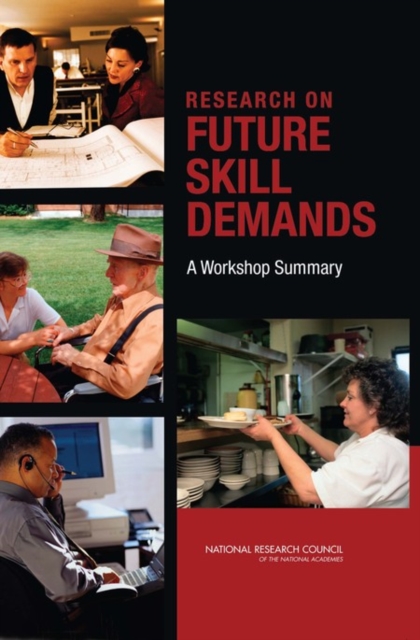
Research on Future Skill Demands : A Workshop Summary Paperback / softback
by National Research Council, Division of Behavioral and Social Sciences and Education, Center for Education
Edited by Margaret Hilton
Paperback / softback
Description
Over the past five years, business and education groups have issued a series of reports indicating that the skill demands of work are rising, due to rapid technological change and increasing global competition.
Researchers have begun to study changing workplace skill demands.
Some economists have found that technological change is "skill-biased," increasing demand for highly skilled workers and contributing to the growing gap in wages between college-educated workers and those with less education.
However, other studies of workplace skill demands have reached different conclusions.
These differences result partly from differences in disciplinary perspective, research methods, and datasets. The findings of all of these strands of research on changing skill demands are limited by available methods and data sources. Because case study research focuses on individual work sites or occupations, its results may not be representative of larger industry or national trends.
At a more basic level, there is some disagreement in the literature about how to define "skill".
In part because of such disagreements, researchers have used a variety of measures of skill, making it difficult to compare findings from different studies or to accumulate knowledge of skill trends over time. In the context of this increasing discussion, the National Research Council held a workshop to explore the available research evidence related to two important guiding questions: What are the strengths and weaknesses of different research methods and data sources for providing insights about current and future changes in skill demands?
What support does the available evidence (given the strengths and weaknesses of the methods and data sources) provide for the proposition that the skills required for the 21st century workplace will be meaningfully different from earlier eras and will require corresponding changes in educational preparation?Table of ContentsFront Matter1 Framing the Research on Future Skills2 Labor Market Trends: A Loss of Middle-Class Jobs?3 Skill Demands of Knowledge Work4 Skill Demands of Service Work5 Promising New Data and Research Methods6 Skill Supply and Demand7 Implications for Education and Training8 Final ReflectionsReferencesAppendix A: Workshop AgendaAppendix B: Professional and Service Occupational ClustersAppendix C: Biographical Sketches of Planning Committee Members andStaff
Information
-
Available to Order - This title is available to order, with delivery expected within 2 weeks
- Format:Paperback / softback
- Pages:126 pages
- Publisher:National Academies Press
- Publication Date:29/02/2008
- Category:
- ISBN:9780309114790
Other Formats
- PDF from £26.46
- EPUB from £38.87
Information
-
Available to Order - This title is available to order, with delivery expected within 2 weeks
- Format:Paperback / softback
- Pages:126 pages
- Publisher:National Academies Press
- Publication Date:29/02/2008
- Category:
- ISBN:9780309114790






